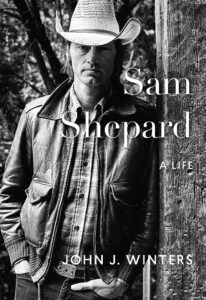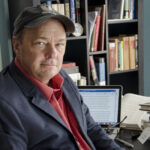Sam Shepard (Jan. 30)
Sam Shepard
Lecture Date: January 30, 2024
The UMW Theatre Lecture

After an introduction to the life and work of Sam Shepard, John will examine the many themes that animate his 1984 play True West, which is being presented in the spring semester by the UMW Theatre Department.
The play answers the dramatic question: What happens when two antagonistic brothers are couped up in their mother’s house on the edge of the desert? Before the final standoff, a typewriter, ample toast, and a badly abused ten iron will be weaponized by the pair.
Shepard’s trademark mix of dark humor, family treachery, and dramatic tension are present throughout True West. However, its author is out for something more with this play. Though the future Pulitzer finalist almost died stillborn.
The playwright knew True West was the best thing he’d written as soon as the play was finished. Yet, getting its premiere off the ground in New York City was long delayed by none other than Shepard’s own actions – his disappearing at critical times during pre-production in order to star in the film Raggedy Man, and sparking endless long-distance battles with legendary producer Joe Papp over casting choices. John will present a short version of this perplexing incident in Shepard’s career and how the play was ultimately pulled from the fire and restored in a second “premiere,” 3,000 miles from Broadway.
The themes to be subsequently discussed will include the long and twisty roots of Shepard’s belief in multiple personalities, which in part drives the plot of True West. As an adult, this idea was reinforced for him through his involvement with G.I. Gurdjief, a Russian mystic of dubious reputation. John will discuss the main ideas behind Gurdjief’s belief system and the ways in which it impacted both play and playwright.
Shepard’s relationship with his alcoholic father, a one-time war hero and teacher who became mostly absent from his son’s post-adolescent life, hovers like a specter over True West. He is a subject of both humor and fear, and always a cautionary tale that the two brothers must recognize before it becomes too late for them.
The closing of the frontier in 1890 and the subsequent death of the American West were topics that long interested Shepard. In his plays and prose, he often riffs on the idea of an authentic West versus its disheartening modern replacement marked by overdevelopment, fake adobe storefronts, rampant consumerism, and casual vulgarity. As he famously said early in his career, “Old ranchero California is dead.”
More Sources
-
American Dreams: the imagination of Sam Shepard by
Call Number: PS3569.H394 Z56ISBN: 0933826133Publication Date: 1981-06-01The standard critical work on the author features two dozen essays and miscellaneous pieces by leading theatre critics, directors, and actors on the plays and productions of Shepard, from the beginning of his career. A special section by the author on his own work is also included. -
Staging Masculinity : male identity in contemporary American drama by
Call Number: PS338.M46 M33 1997ISBN: 0786402687Publication Date: 1996-12-01The men in plays such as Arthur Miller's Death of a Salesman or Sam Shepard's True West are often presented as universal, with little attention given to their gender. Instead, their stories are viewed by author and critic as encompassing dynamics relevant to humanity rather than specifically to men. This study explores how masculinity is presented in the works of such leading male playwrights as Shepard, Miller, Eugene O'Neill, David Mamet, David Rabe, and August Wilson. It becomes apparent that male playwrights return often to the issues of troubled manhood, usually masked in other issues such as business or family. The plays indicate both the attractiveness of traditional masculinity and the illusive nature of this image, which all too often fractures and fails the characters who pursue it. -
Sam Shepard by
Call Number: PS3569.H394 Z67 1992ISBN: 0805739645Publication Date: 1992-08-01"From the 1964 "off-off" Broadway premiere of his first play, Cowboys, to the post-Desert Storm opening of his recent States of Shock, Sam Shepard has won public praise, survived critical attack, and stirred repeated controversy as one of America's most original theatrical talents. With hallucinatory plays populated by cowboys, rock stars, space aliens, and other archetypal figures of American pop culture, Shepard has reshaped the course of modern American drama. His dramatic portraits of the dysfunctional American family, composed in theatrical states of exploded consciousness, expose the lurking chaos and inherent violence of post-modern American society. His relentless artistic output has moved him from the fringe of American culture to ever-widening popular recognition, culminating in his 1979 Pulitzer Prize for Drama and the tribute of seeing his plays surpass even those of Tennessee Williams as the most frequently produced in this country." "David DeRose's study of Shepard is the most comprehensive to date, with commentary on all the plays, including Shepard's early "lost" plays, his experimentations in music theater, and his most recent work, States of Shock. DeRose draws on his access to many of Shepard's unpublished works and his personal exposure to Shepard's plays in production at Yale University, in New York City, and at the Magic Theater in San Francisco. His dual perspective as scholar and director provides unusual and penetrating insights into Shepard's theatrical intentions and thematic concerns. Written in smooth and highly accessible prose, Sam Shepard will serve as the definitive work on the playwright for years to come."--BOOK JACKET.Title Summary field provided by Blackwell North America, Inc. All Rights Reserved -
Sam Shepard, Arthur Kopit, and the Off-Broadway Theater by
Call Number: PS351 .A9 1982ISBN: 0805773711Publication Date: 1982-12-01 -
Sam Shepard: The Life and Work of an American Dreamer by
Call Number: PS3569.H394 Z79 1986ISBN: 0312698399Publication Date: 1986-01-01 -
Rereading Shepard by
Call Number: PS3569.H394 Z85 1993ISBN: 0312074794Publication Date: 1992-12-18Rereading Shepard draws together 13 original theoretical perspectives on one of America's most important contemporary playwrights. Representing a range of critical appraoches - including semiotics, deconstruction, and feminism - the essays address recent debates emerging in Shepard criticism. These include the status of Shepard's texts within the modernist tradition on the one hand and a developing post-modernism on the other, and the feminist debate over Shepard's drama - does it reinforce a masculinist world or does it provide some oppositional stance toward patriarchal 'master narratives'? -
Sam Shepard's Metaphorical Stages by
Call Number: PS3569.H394 Z69 1987ISBN: 0313253730Publication Date: 1987-01-13A wonderfully helpful survey of the drama of Sam Shepard. It is bound to find many eager readers among those who are either intrigued or baffled--or both--by the plays of this still-young playwright whom many think contemporary America's finest. Choice America's most highly acclaimed contemporary playwright continues to puzzle critics, even as his reputation grows and his imagination seeks new creative channels. Finding the dramatist difficult to classify, critics and scholars continue to search for the central direction of Shepard's creative development. Lynda Hart's study, which focuses on ten representative plays, is the first book to examine Shepard's growth and development as a dramatist within and against the historical tradition. Offering a unified critical perspective, the author considers the plays from both a literary standpoint and as texts for performance. Resources include a bibliography that offers the most complete listing of relevant critical writings. -
States of Shock, Far North, and Silent Tongue by
Call Number: PS3569.H394 A6 1993ISBN: 0679742182Publication Date: 1993-05-04In his latest play, States of Shock, Sam Shepard turns a bizarre anniversary party into a grisly yet hilarious reopening of the wounds of war, sex, and family betrayal. This volume also includes Shepard's screenplay for the film Far North and the forthcoming film Silent Tongue.
Speaker: John Winters
Speaker: Jon Winters

John J. Winters is a veteran journalist, arts writer, educator, and author of Sam Shepard: A Life.
He is a Massachusetts native whose career has included everything from racing horses, to working for a Fortune 500 company, to teaching in the state’s prison system. Over the past three decades, John has written for newspapers, magazines, web sites and for broadcast.
He turned his academic focus to the life and work of Sam Shepard nearly a decade ago. The result was his 2017 biography of the renowned playwright, fiction writer, horseman, and actor.
John is a graduate of Emerson College and Bridgewater State University, and has taught at Bridgewater, Roger Williams University, and in the Department of Corrections division of Community Colleges of Rhode Island.
He lives in Rhode Island with his wife, Karen Callan, and their pets.
